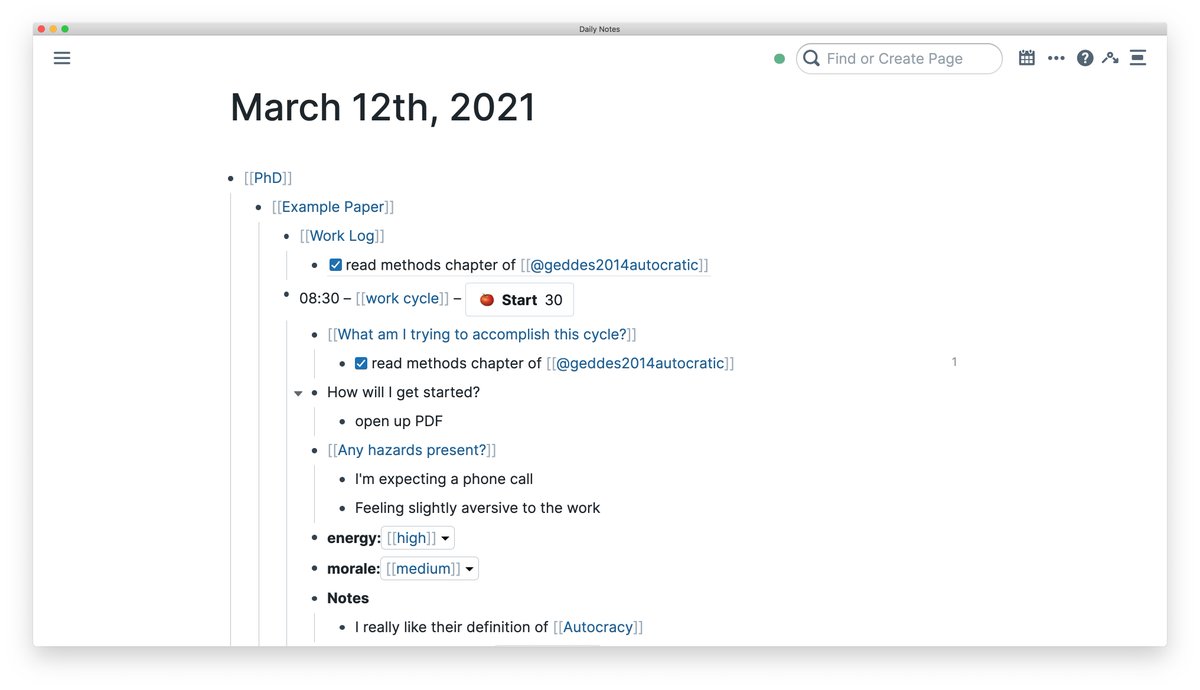
So I'm working on a video on context switching, interstitial journaling and related things – things I learned from @ultraworking and how I use @RoamResearch for it now. I'll thread my brainstorming for the video below, feel free to ask questions. #roamcult
We all know that context switching is bad, Maker/Manager schedule etc. Fact is, we still have to context switch all the time, even if we have control over our schedule and work.
Projects take more than one day or block of hours – so you inevitably have to switch "in and out" of a given project. Even if that switch is just between personal life and that singular project.
What the folks at @ultraworking have figured out is that if you combine the idea of pomodoros with a specific way of doing interstitial journaling, you can maintain focus over _really_ long stretches at a time and switch into a project much easier.
I've used this approach ever since it helped me finish my MA Thesis despite undiagnosed ADHD at the time. And I've taught it to literally hundreds of people while I worked @ultraworking in 2019. It works.
When @sebastmarsh came up with Work Cycles he used spreadsheets to structure this approach. Since switching to Roam, I've run Work Cycles there with the help of @roamhacker's Roam42 and now native templates. Magical.
The most bare-bones version of this process means that you work for 30minutes, then debrief and plan the next 30 minutes for 10 minutes, repeat.
Planning is really simple: you ask yourself three questions. What am I trying to accomplish? How will I get started? Are there any hazards present? This helps you overcome the biggest hurdle most people face when starting work: not knowing exactly what to do first. 

By asking whether there are any hazards present, you can anticipate and preempt anything distracting you from your work. Make that question a page link in Roam, and over time you get a nice collection of distractions you'll want to eliminate and be aware of. Boom.
By properly indenting all of this like in the picture and linking things, it's really easy to collect everything you've done and accomplished in a day, week, month for a given project and make effort and progress visible. 

After 30 minutes are up, you review: did you get done what you wanted? What worked, didn't? Any distractions? What can you do better next time? Great way to improve processes. 

Using Work Cycles is a great way to "fall into" hyperfocus. I often do two or three cycles and then literally forget to call the template because I'm so into the work. That's fine – this isn't about doing paperwork, but getting things done.
You can also take this a level up and say: okay, in the next 4 hours I'm going to do 6 cycles working on X and plan a "Cycle Session" basically a level up of a Work Cycle. Works by asking questions again:
What am I trying to accomplish? Which goal does this bring me closer to? Why is that goal important? How will I know the work is complete? Risks and hazards? Concrete or ambiguous work? 

• • •
Missing some Tweet in this thread? You can try to
force a refresh



